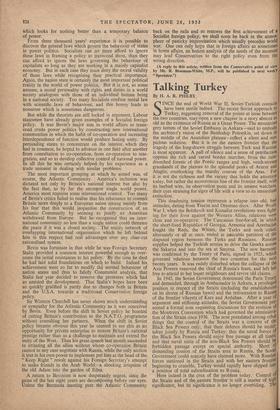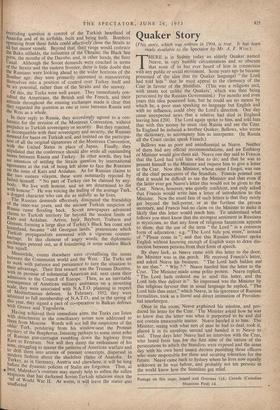Talking Turkey
By H. A. R. PHILBY SINCE the end of World War II, Soviet-Turkish contacts have been sterile indeed. The recent Soviet approach to Turkey, suggesting removal of the points at issue between the two countries, may open a new chapter in a story almost as old as the existence of Russia as a Great Power. The monstrous grey turrets of the Soviet Embassy in Ankara—said to embody the architect's vision of the Battleship Potemkin, set down in the middle of the Anatolian plateau—reflect-a silent and sus' picious isolation. Hilt it is on the eastern frontier that the tragedy of the long-drawn struggle between Turk and Russian is most apparent. A pall of silence and a sense of petrifaction oppress the rich and varied border marches, from the rain' drenched forests of the Pontic ranges and high, vetch-strewn grasslands of the plateau to the splendid peaks of Ararat and Alagez, overlooking the marshy courses of the Aras. For it is not the richness and the variety that holds the attention today, but rather the monotonous line of the frontier itself, with its barbed wire, its observation posts and its unseen watchers, their eyes straining for signs of life with a view to.its immediate extinction. This deadening tension represents a relapse into old, bad, attitudes, dating from Tsarist and Ottoman days. After World War I, when the Bolshevik and Kemalist revolutions were fight', ing for 'their lives against the Western Allies, relations were close and co-operative. The Caucasian free-for-all, in which the short-lived Republics of Georgia, Armenia and Azerbaijan fought the Reds, the Whites, the Turks and each other, alternately or all at once, ended in amicable partition of the disputed region between the Turks and Russians. Russian supplies helped the Turkish armies to drive the. Greeks across the Sakarya and into the sea at Smyrna. The new harmony was confirmed by the Treaty of Paris, signed in 1925, which governed relations between the two countries for the next twenty years. It was rudely disturbed when the collapse of the Axis Powers removed the chief of Russia's fears, and left het free to attend to her lesser neighbours and revive old claims. In 1945, the Soviet Government denounced the Paris Treat} and demanded, through its Ambassador in Ankara, a privileged position in respect of the Straits (including the establishment on its shores of Russian bases) and the retrocession to Russia of the frontier vilayets of Kars and Ardahan. After a year of argument and stiffening attitudes, the Soviet Government pre: sented a formal note requesting discussions for the revision 01 the Montreux Convention which had governed the administra- tion of the Straits since 1936. The note postulated among other things that the control of the Straits was a concern of the Black Sea Powers only; that their defence should be under: taken jointly by Russia and Turkey; that the naval forces 01 the Black Sea Powers should enjoy free passage at all times; and that naval units of the non-Black Sea Powers should be, forbidden passage except on special authority. Short 0! , demanding cession of the Straits area to Russia, the Soviet Government could scarcely have claimed more. With Russian forces stationed in the Straits and with her eastern frontlet beginning to crumble, Turkey would rapidly have slipped into a position of total subordination to Russia, Here indeed is the crux of the problem today.' Control of the Straits and of the eastern frontier is still a matter of high significance, but its significance is no longer overriding. The overriding question is control of the Turkish heartland of Anatolia and of its airfields, built and being built. Bombers operating from these fields could effectively-close the Straits to all but minor vessels. Beyond that, their range would embrace the Baku oilfields, the industries of the Ukraine, the Black Sea ports, the mouths of the Danube; and, in other hands, the Suez Canal. Although the Soviet demands were couched in terms of the Straits .and the eastern frontier, there is little doubt that the Russians were looking ahead to the wider horizons pf the Bomber age; they were primarily interested in manoeuvring themselves into a position of control over Turkey itself and its air potential, rather than of the Straits and the seaway.
Of this, the Turks were well aware. They immediately con- sulted the Americans, the British and the French, and their attitude throughout the ensuing exchanges made it clear that they regarded the question as one at issue between Russia and the West as a whole.
In their reply to Russia, they accordingly agreed to a con- ference for the revision of the Montreux Convention, without prejudice to Turkish sovereignty'or security. But they rejected, as incompatible with their sovereignty and security, the Russian demand for bases on Turkish soil, and insisted on the participa- tion of all the original signatories of the Montreux Convention, with the United States in place of Japan. Finally, they stipulated that the conference should also settle all outstanding issues between Russia and Turkey. In other words, they had no intention of settling the Straits question by international agreement at the risk of being left alone to face the Russians on the issue of Kars and Ardahan. As for Russian claims to the two eastern vilayets, these were summarily rejected by Inonii himself. " No part of Turkey can be claimed by any- body. We live with honour, and we are determined to die with honour." He was voicing the feeling of the average Turk, a dogged character 'who can .die as stolidly as he lives. The Russian demands effectively dissipated the friendship of the inter-war years, and the ancient Turkish suspicion of Russia came flooding back. Soviet newspapers advanced claims to Turkish territory far beyond the modest limits of Kars and Ardahan. Artvin, Ispir, Bayburt, Trabzon and Giresun, forming a large slice of Turkey's Black Sea coast and hinterland, became " old Georgian lands," pretensions which _rurkish propagandists answered with a vigorous counter- barrage. In this clamour of angry words, the diplomatic exchanges Sea squall.petered out, as if foundering in some sudden Black Meanwhile, events elsewhere were crystallising the issues between the Communist world and the West. The Turks set to work with patience and persistence to turn the situation to their advantage. Their first reward was the Truman Doctrine, with its promise of substantial American aid; next came their admission to the Council of Europe. Then, as an inevitable consequence of American military assistance on a mounting scale, they were associated with N.A.T.O. planning in respect of Mediterranean defence. In February, 1952, they were admitted to full membership of. N.A.T.O., and in the spring of this year, they signed a pact of co-operation in Balkan defencewith Greece and Yugoslavia. Having achieved their immediate aims, the Turks can listen With detachment to the conciliatory noises now addressed to them from Moscow. Words will not lull the suspicions of the older Turk, pondering from his window-seat the Protean rnystery of the Bosphorus, listening perhaps to some inner echo of Russian gun-carriages rumbling down the highway from Kars to Erzerum. Nor will they damp the enthusiasm of his sons, struggling to master the patterns of American warfare and to drill them into armies of peasant conscripts, dispersed in modern fashion about the shadeless plains of Anatolia. In i.11.1.1(ey, as in Germany, Austria and elsewhere, it will be long before the dynamic policies of Stalin are forgotten. Thus, at • _best, Malenkov's overture may merely help to soften the sullen suspicion that has darkened Soviet-Turkish relations since the n d of World War. II. At worst, it will leave the status quo unaffected



































 Previous page
Previous page